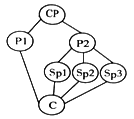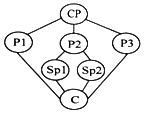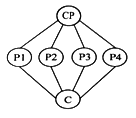湖南省永州市2018届高三下学期英语第三次模拟考试试卷
试卷更新日期:2018-05-14 类型:高考模拟
一、完形填空
-
1. 完形填空
The boys had been shopping all morning and still weren't done. I1standing in the store.
Just nine days before 2 Caitlin's house had burned to the ground. But Caitlin and her family all3 escaped.
All the family 4 was what they were wearing and each other. The school was replacing their books and uniforms and now, two days after the 5all the girls in Caitlin's class were taking her shopping for clothes and shoes. The boys were shopping for6 like scarves, socks and hair ties, all the things they don't even 7
After another hour, I had finished my8 and had helped the boys 9everything they wanted to get for Caitlin.
When we got home, my brother brought everything he had10 for Caitlin to my room to make sure I thought she'd 11 everything before he12 them.
"I think she'll love everything," I said, and he smiled his big smile. I hugged him13 he tried to push me away. I was so14of him at that moment. He loves giving and making others 15 He's an honest kid who sees only the good in the world. I used to wonder how he could 16 see the good when there was so much bad, but now I 17why there is so much good18 him.
He selflessly gave up all his 19for Caitlin. He had, through this act of a pure heart, got the true20 of Christmas.
(1)A、waited B、hesitated C、shouted D、observed(2)A、Christmas B、graduation C、school D、departure(3)A、gradually B、obviously C、successfully D、hopefully(4)A、belonged B、possessed C、liked D、desired(5)A、rescue B、discovery C、flood D、fire(6)A、decorations B、items C、products D、tools(7)A、think about B、hear of C、care about D、dream of(8)A、homework B、interview C、shopping D、project(9)A、try on B、prepare for C、experiment with D、pick out(10)A、kept B、owned C、purchased D、demanded(11)A、use B、like C、donate D、get(12)A、wrapped B、rolled C、changed D、bought(13)A、because B、in case C、even though D、before(14)A、confident B、proud C、careful D、afraid(15)A、happy B、comfortable C、excited D、calm(16)A、even B、seldom C、ever D、just(17)A、doubt B、distinguish C、realize D、judge(18)A、beside B、inside C、before D、around(19)A、toys B、joy C、time D、savings(20)A、spirit B、origin C、aim D、story二、阅读理解
-
2. 阅读理解
As the weather costs you a loss on trains and flights, we look at your rights.
Cancelled trains
On a single ticket, a passenger will usually receive 25% of the fare if the train is delayed by 15 minutes. If the delay reaches 30 minutes, the compensation(补偿金)rises to 50%, and if it's over an hour you should be able to reclaim the whole cost. Clear arrangements vary according to train operators(运营商).
If you were due to travel, to say Aberdeen from London, your train is cancelled and you decide not to travel, you can get a full compensation. If you had a non-cancelable ticket with one operator, and failed to make that train because the connecting train was delayed, you can take the next available train.
Flights
If your flight is cancelled because of the snow you have the right to s full compensation of the ticket, or to be rerouted home on a later flight.
But you will have no right to get a delay or cancellation compensation under EU rules, because the snow is an extraordinary circumstance beyond the airline's control. If you don't take the compensation and choose to be rerouted, and it means you are stuck at the airport overnight, it's the airline's duty to pay for a reasonably priced hotel room and meals.
The airline has to reroute you at the earliest opportunity, or at the passenger's free time, you are supposed to take the availability of seats.
If you choose to be rerouted or if your departure is delayed by more than two hours, airlines also have to provide assistance such as food. The airlines keep this quiet and getting the money out of the low-cost operators can be a hard job. Keep evidence of cancellations, all receipts, and use your mobile to video any offer to pay by airline staff.
(1)、What is your compensation determined by when your trains are delayed due to bad weather?A、The operator. B、The price of the ticket. C、The length of delay time. D、The class of the service and the price of the ticket.(2)、How many choices do you have if you are to travel Aberdeen from London, and your train is cancelled?A、One. B、Two. C、Three. D、Four.(3)、How can you save the trouble in getting g money out of the low-cost operators?A、By keeping the evidence and videoing any offer to pay. B、At the earliest opportunity, or the passenger's free time. C、By preventing the airlines from keeping their duty quiet. D、By arguing reasonably with the staff of the airlines offering you the flight.3. 阅读理解A few weeks ago, I called an Uber to take me to the Boston airport for a flight home for the holidays. As I slid into the back seat of the car, the warm intonations(语调)of the driver's accent washed over me in a familiar way.
I learned that he was a recent West African immigrant with a few young children, working hard to provide for his family. I could relate: I am the daughter of two Ethiopian immigrants who made their share of sacrifices to ensure my success. I told him I was on a college break and headed home to visit my parents. That's how he found out I go to Harvard. An approving eye glinted(闪烁)at me in the rearview window, and quickly, we crossed the boundaries of rider and driver. I became his daughter, all grown up – the product of his sacrifice.
And then came the fateful question: "What do you study?" I answered "history and literature" and the pride in his voice faded, as I knew it might. I didn't even get to add "and African-American studies" before he cut in, his voice thick with disappointment. "All that work to get into Harvard, and you study history?"
Here I was, his daughter, squandering the biggest opportunity of her life. He went on to deliver the age-old lecture that all immigrant kids know. We are to become doctors (or lawyers, if our parents are being generous) – to make money and send money back home. The unspoken demand, made across generations, which my Uber driver laid out plainly, is simple: Fulfill your role in the narrative(故事)of upward mobility so your children can do the same.
I used to feel anxious and backed into a corner by the questioning, but now as a junior in college, I'm grateful for their support more than anything. This holiday season, I've promised myself I won't get annoyed at their inquiries. I won't defensively respond with "but I plan to go to law school!" when I get unrequested advice. I'll just smile and nod, and enjoy the warmth of the occasion.
(1)、What disappointed the driver?A、The author's attitude towards him. B、The school that the author is attending. C、The author's majors in history and literature. D、The author's interests can replace the in African American studies.(2)、Which of the following can replace the underlined word "squandering" in Paragraph 4?A、wasting B、creating C、valuing D、seizing(3)、Why are immigrant kids expected to be doctors or lawyer?A、They are very smart in general. B、They have more opportunities. C、Their parents are high achieving as well. D、Their parents want them to move upward in society.(4)、How did the author feel about the driver's questioning?A、Getting upset. B、Feeling satisfied. C、Defending herself. D、Appreciating his concern.4. 阅读理解As self-driving cars come closer to being common on American roads, much of the rhetoric(说辞)promoting them has to do with safety. About 40,000 people die on U.S. roads every year, and driver errors are linked to more than 90 percent of crashes. But many of the biggest advocates of autonomous(自动的)vehicles aren't car companies looking to improve the safety of their existing products. Huge support for itself-driving technologies is coming from Silicon Valley giants like Google and Apple.
Those of us who have studied the relationship between technology and society tend to look more carefully at the motivations behind any technologically push. In this case, it's clear that in addition to addressing safety concerns, Silicon Valley firms have a strong incentive(动机)to create a new venue for increasing the use of their digital devices. Every minute people spend on their mobile phones provides data—and often money—to tech companies.
At present, digital devices and driving are in conflict: There are serious, often fatal, consequences when drivers use smartphones to talk or to text. Regulators and safety advocates look to resolve dial conflict by banning phone use while driving – as has happened in almost every state. But the tech companies are taking a different approach. The obvious answer for Silicon Valley is creating an automobile in which continuous cellphone use no longer poses a threat to anyone.
In recent years, the amount of time adults spend on their mobile devices has grown rapidly. At the moment, it's around four hours a day for the average adult in the U.S. However, that rapid growth is likely to slow down as people run out of time that's available for them up to use their devices. Unless, of course, there's a new block of time that suddenly opens up. The average American now spends about 48 minutes in a car every day, a sizeable opportunity for increased cellphone use.
Sop as the public conversation around autonomous cars highlights the safety advantages, don't forget the tech industry's powerful desire for more profits, which goes well beyond simply saving us from ourselves.
(1)、Who are responsible for most traffic accidents in American?A、Car companies. B、Drivers. C、Tech companies. D、Self-driving cars.(2)、What pushes Silicon Valley to promote self-driving technologies?A、To make more money. B、To reduce traffic accidents. C、To limit the use of digital devices. D、To support car companies.(3)、What does the underlined phrase “a new block of time” possibly refer to?A、The working time. B、People's spare time. C、The time spent in the car. D、The time spent on mobile devices.(4)、What can we know from the passage?A、We should teach people to strictly obey traffic rules. B、The writer calls on us to look at autonomous cars wisely. C、Car companies are the leading promoters of self-driving cars. D、No solution to the conflict between mobile phone use and driving has been found yet.5. 阅读理解The organic food has gained a lot of [popularity as they are being considered as healthier and tastier. A fair number of people advocate a large-scale shift to organic farming from conventional agriculture. But this might not seem well-founded.
Since the mid-19th century, conventional industrial agriculture has become incredibly efficient on a simple land to food basis. Conventional farming gets more and more crop per square foot of land, which can mean less wilderness needs to be transformed to farmland.
To make farming more efficient, conventional agriculture uses a significant amount of synthetic fertilizer(合成肥料)each year, and all that nitrogen(氮)enables much faster plant growth. However, the cost is paid in vast polluted dead zones at the months of many of the world's rivers, because much of the nitrogen ends up running off the soil and into the oceans. This also makes conventional farming one of the major threats to the environment.
To weaken the environmental impact of agriculture, improve soil quality as well as produce healthier foods, some farmers have turned to organic farming. Environmentalists have also welcomed organic food as better for the planet than the food produced by agricultural corporations. Organic practices — refusing artificial fertilizers and chemical pesticides –are considered far more sustainable. Sales of organic food rose 7.7% in 2010, up to $26.7 billion—and people are making those purchases for their moral senses as much as their tongues.
Yet a new meta-analysis in Nature does the math and comes to a hard conclusion: organic farming produces 25% fewer crops on average than conventional agriculture.
In the Nature analysis, scientists performed an analysis of 66 studies comparing conventional and organic methods across 34 different crop species, from fruits to grains. They found that organic farming delivered a lower output for every crop type, though the difference varied widely. For crops like fruit trees, organic trailed(落后于)conventional agriculture by just 5%. Yet for major grain crops and vegetables – all of which provide the world's main calories – conventional agriculture outperformed organics by more than 25%.
What that means is that while organic farming may be more sustainable than conventional agriculture, there are trade-offs(此消彼长)with each. So an ideal global agriculture system may borrow the best from both systems rather than upholding merely organic or conventional practices.
(1)、What's the author's purpose of writing the passage?A、To compare two types of farming. B、To criticize conventional agriculture. C、To discuss the development of farming. D、To argue for a realistic agriculture system.(2)、What do we know about conventional farming?A、It produces more crops with fewer fertilizers. B、It achieves efficiency at a huge cost to the environment. C、If offers a long-term solution to global demand for food. D、It performs far better for each crop type than organic farming.(3)、What does the author most probably agree with?A、Employing organic farming to plant rice. B、Adopting organic practices to grow potato. C、Using conventional methods to plant cabbage. D、Applying conventional farming to growing apple.(4)、Which of the following shows the development of ideas in this passage?CP: Central Point P: Point Sp: Sub-point(次要点) C: Conclusion
A、 B、
B、 C、
C、 D、
D、
三、任务型阅读
-
6. 任务型阅读
People Are People
Globalization has brought different cultures together in a way unimaginable one hundred years ago. Today, Chinese, Indians, Arabs, Africans, Anglos, and Hispanics may all work in the same offices, attend the same schools or live in the same neighborhoods And our society has lately emphasized(强调)the importance of diversity.
Take the following old proverbs for example.
“Honesty is the first chapter in the book of wisdom.” Thomas Jefferson, American President
“One falsehood spoils a thousand truths.” African proverb
“Be honest to those who are honest, and be also to those who are not honest.” Lao Tzu, Chinese philosopher
“A sacrifice is written off by a lie and the merit of devotion by an act of cheat.” Hindu saying
These seems to be a sort of cultural unity.
We don't wish to imply all cultures are the same. Cultural diversity is real, and people from different cultures view many situations in different ways. However, historically, different cultures seem to share many common values. They are justice, courage, patience, generosity, equality, mercy and kindness, respect for the elders, and many more. Lying and stealing appear to be wrong no matter where you go. Perhaps some cultures make room for extenuating(情有可原)circumstances more than others; perhaps cultures apply these virtues in different ways; and when values disagree, different cultures may place different levels of importance on them But both cultures may still value both.
To us, it seems as if there is some sort of code of right and wrong that everyone everywhere seems to understand, regardless of culture. It is almost as if, behind all of the diversity, one finds a common understanding – a human culture, if you will – that goes beyond racial, social, and political boundaries.
A. All people seem to agree that we should tell the truth.
B. As cultures meet with each other, many differences stand out.
C. Each value supports many more sayings from different cultures.
D. We want to show, however, that there is more to these cultures than diversity.
E. These sayings from four separate cultures all support the same value – honesty.
F. It is almost as if, despite all our differences, we are all still the same – we are just people.
G. In other words, one culture may lean more toward justice and another culture more toward mercy.
四、短文改错
-
7. 假定英语课上老师要求同桌之间交换修改作文,请你修改你同桌写的以下作文。文中共有10处语言错误,每句中最多有两处。每处错误仅涉及一个单词的增加、删除和修改。
增加:在缺词处加一个漏字符号(∧),并在其下面写出该加的词。
删除:把多余的词用斜线(\)划掉。
修改:在错的词下划一横线,并在该词下面写出修改后的词。
注意:1.每处错误及其修改仅限一词;
2.只允许修改10处,多者(从第11处起)不计分。
Last Saturday, our class paid the visit to the Welfare Centre for children in our city. On our arrival, we donated some gift to the kids, which made them very pleased. Then we did what we could help them. Some swept and tidied their rooms. Some play games with them. And others told interesting stories to them. The day passed quickly after we knew it.
Honestly speaking, though tired, they were much happier than ever that day. The reason is that when we help with others, we also get something more importantly. Therefore, show your love and care, or our society will be more beauty and more harmonious.
五、语法填空
-
8. 语法填空
Nearly 610,000 Chinese students attended schools and colleges overseas in 2017. China remains the world's (large) supplier of international students. A majoritythe students went to European and North American countries. Countries (include) in the Belt and Road Initiative (B&R) became new destinations, with student numbers (rise) by 15.7 percent in 2017. At the same time, about 480,000 graduates returned to China. Since 1978, about 5.2 million Chinese (study) abroad and among those graduated about 83.7 percent returned to China.
Meanwhile, a total of 490,000 (foreign) from 204 countries and regions studied in China is 2017. Students from the Republic of Korea, Thailand and Pakistan were the most numerous, while the United States ranked (four). Students from B&R countries accounted for 64.9 percent of total. About 59,000 international students in China (support) by Chinese government scholarships.
六、书面表达
-
9. 假定你是李华,你的美国朋友Peter对中国春联(Spring Festival couplets)产生了浓厚兴趣,来信向你了解中国的春联文化。请你用英语写一封回信,为他介绍春联的用途、内容和寓意等。
注意:1)词数100左右;
2)可以适当增加细节,以使行文连贯;
3)开头和结尾已给出,不计入支出数。
Dear Peter,
I'm glad to know you have a great interest in Spring Festival couplets.
Yours,
Lihua
-
-
-
-